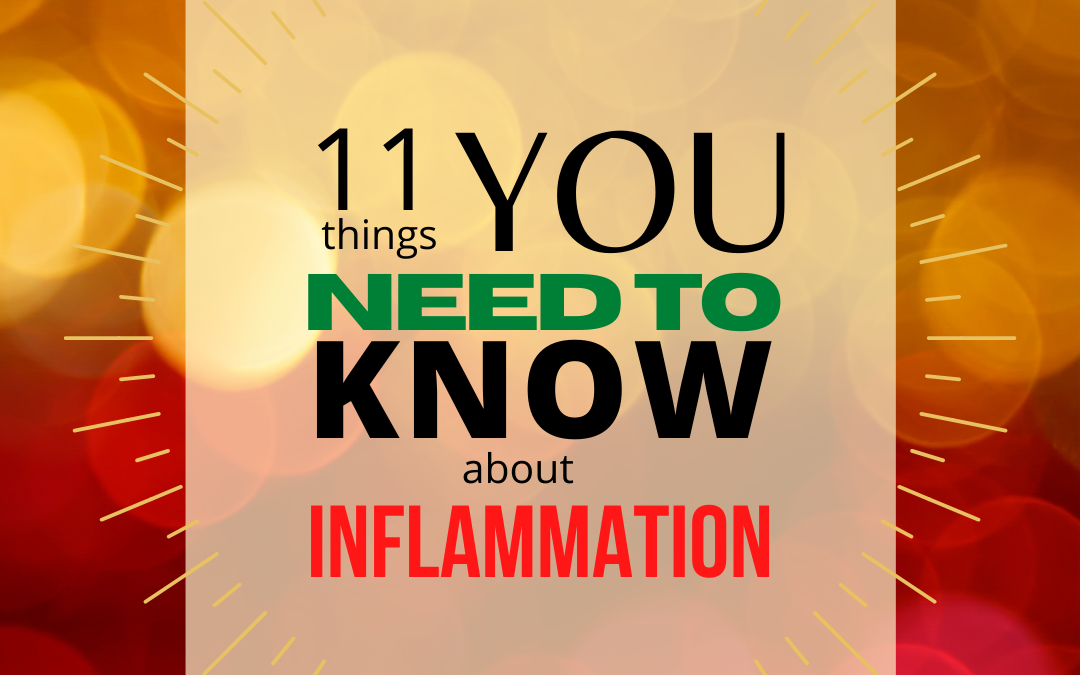Did you know that inflammation is now thought to be at the root of many chronic diseases? Despite increasing recognition, many people are still unaware of its impacts. Find 11 things you need to know about inflammation, its effects and causes and finally, how to reduce it in this guide.
Inflammation is increasingly gaining recognition as a major contributor to many of the diseases which plague us as more and more research is conducted into its effects. I speak from personal experience when I say that I know this to be true. I had a host of seemingly unlinked conditions, which could (almost miraculously) be massively reduced by working to lower my inner inflammation levels. It took a lot of personal reading and learning to find this out though.
But staying ahead of the latest research and reading science articles isn’t everyone’s cup of tea, so let me put it into simpler terms to save you the effort.
Here are 11 things that everyone should know about inflammation.
1) Inflammation is crucial to our body’s health
Inflammation is a really important and natural part of our body’s immune response to pathogens and damage. When triggered, immune cells produce a variety of inflammatory substances. These cause reactions varying from increased blood flow (resulting in heat and swelling) to the release of chemicals and to the destruction of infected cells.
It’s only when the inflammation doesn’t recede after the trigger is removed, or where the response is being repeatedly triggered that this becomes a problem. The body needs periods of time in between inflammation in which to repair the damage caused by the inflammatory agents. Without this down time, the body continues to decline, resulting in a host of varied symptoms.
2) A small amount of alcohol can lower inflammation
A lower level of inflammation markers were seen [1] in people who consumed a small amount of alcohol than those who have consumed none! This isn’t to say that it’s good for you, there are other negative factors to consider too, but if you’re looking to reduce inflammation levels, drinking small amounts of alcohol could help. Note that consuming in larger amounts raises inflammation though, so go steady…
3) Vapes and e-cigarettes are linked to inflammation
A 2018 study [2] found that e-smoking causes elevated inflammation levels. They’re still better than real cigarettes, but perhaps this can help motivate you to give up altogether… (especially after you read number 6…).
4) Exercise can reduce inflammation
Research [3] has found that a single 20 minute exercise session can trigger an anti inflammatory response. This doesn’t need to be high intensity, a simple walk or yoga session is sufficient.
5) Inflammation can cause insomnia
Elevated levels of inflammation markers were found [4] in those who were experiencing insomnia. The next question is, which came first? Inflammation appears to trigger insomnia, which in turn exacerbates inflammation [5]. A vicious cycle that gradually worsens over time.

6) Chronic inflammation has been linked to many serious diseases
There are a few well known diseases linked to the immune system, like Rheumatoid Arthritis and other auto immune diseases. But there is new evidence linking many others, from heart disease [6], to Alzheimer’s [7] and cancer. The National Cancer Institute explains that chronic inflammation can cause cancer because of its long-term damage to DNA, which causes problems in the replication of cells that can lead to cancers.
Unfortunately, we are often unaware that there are low lying levels of chronic inflammation in the body and by the time we are diagnosed, it is almost too late.
7) Fat, especially belly fat, diabetes and inflammation are linked
Excess body fat, especially in the abdomen, causes continuous low levels of inflammation that change the action of insulin and can increase the risk of diabetes [9].
As type 2 diabetes starts to develop, the body becomes less sensitive to insulin and the resulting insulin resistance also leads to inflammation. Cue a vicious cycle, with more inflammation causing more insulin resistance etc. Over time, blood sugar levels creep higher and higher, eventually resulting in type 2 diabetes [9].

8) Stress is a major contributor to inflammation
Studies have shown that stress can cause resistance in the receptors which control and reduce inflammation, causing the levels to remain high even after the triggers have been removed [10].
9) High levels of inflammation are linked to increased illnesses like colds
High levels of stress and inflammation can cause decreased sensitivity to cortisol, which is the modifier of the immune response. It has been proposed [11] that with illnesses like the common cold, the symptoms are not actually caused by the virus. Instead they are a side effect of the inflammatory response of the body in an effort to fight the infection. The greater the body’s inflammatory response to the virus (made higher by poor regulation), the higher the chance of feeling the symptoms of a cold and the worse they will be.
10) There’s a link between depression and high inflammation
The evidence isn’t as conclusive as some of the other conditions, but the volume is increasing that depression can be caused or exacerbated by inflammation [13]. Given that levels of both depression and inflammation are rising in the population currently this makes sense. Higher levels of inflammation have been linked to those with depression, although researchers are not yet sure whether it’s because depression causes higher levels of inflammation, like stress, or if the inflammation increases the risk of depression [12].
11) Inflammation can be reduced without medication
Time for the good news! Many foods have been shown to be anti inflammatory, others increase inflammation in the body.
Unsurprisingly, the anti-inflammatory foods are the ones considered ‘healthy’ and which support our bodies in many other ways. Tomatoes, nuts, antioxidant rich fruits (i.e. strawberries, blueberries), leafy greens (kale, spinach etc), olive, flaxseed and canola oils, avocados and omega 3 rich fish [8][9] lower inflammation.
On the other hand, fried foods, processed meat and high sugar foods increase it and should be minimised in the diet.
Personally, I don’t think that means that these foods have to be completely eradicated from our diets, but we should eat them mindfully. If you are aware that they increase inflammation, you can reduce portions and/or minimise their effect by eating anti-inflammatory meals for the rest of the day.

In summary, there aren’t many of us these days who do not suffer from elevated inflammation levels. And given that it can cause some very serious diseases, it’s worth all of us paying attention and taking steps to manage and reduce our inflammation.
This is where I can help (and want to as I was one of these super inflamed people not so long ago…). As a nutrition coach my focus is on reducing your chronic inflammation levels, for better health today and in your future. I offer educational programs with change coaching support so you can learn what to change and how to make these changes successfully. Check out how we can work together on my Services Page or book in a free consultation to learn more.
Alternatively, check out my free guide on some super simple ways to reduce your inflammation today. Get it and make a positive step for your health today!

References
- Armin Imhof, Margit Froehlich, Hermann Brenner, Heiner Boeing, Wolfgang Koenig. Effect of alcohol consumption on systemic markers of inflammation. The Lancet. Volume 357, Issue 925810 March 2001Pages 763-767
- Scott A, Lugg ST, Aldridge K, et al. Pro-inflammatory effects of e-cigarette vapour condensate on human alveolar macrophages. Thorax 2018;73:1161-1169.
- Dimitrov, E. Hulteng, S. Hong. Inflammation and exercise: inhibition of monocytic intracellular TNF production by acute exercise via β2-adrenergic activation. Brain Behav Immun, 61 (2017), pp. 60-68
- Joshua H.Baker Alexandros N.Vgontzas JordanGaines DuanpingLiao Edward O.Bixler. Insomnia symptoms with objective short sleep duration are associated with systemic inflammation in adolescents. Brain, Behavior, and Immunity Volume 61, March 2017, Pages 110-116
- Sarosh J. Motivala, Ph.D., Sleep and Inflammation: Psychoneuroimmunology in the Context of Cardiovascular Disease, Annals of Behavioral Medicine, Volume 42, Issue 2, October 2011, Pages 141–152
- K. Hansson. Inflammation, atherosclerosis, and coronary artery disease. N Engl J Med, 352 (16) (2005), pp. 1685-1695
- Mehmet Bostancıklıoğlu. An update on the interactions between Alzheimer’s disease, autophagy and inflammation. Gene, Volume 705, 15 July 2019, Pages 157-166
- Daniela Roxo de Souzaa, Bruno Luiz da Silva Pieria, Vitor Hugo Comima, Scherolin de Oliveira Marquesa, Thais Fernandes Lucianoa, Matheus Scarpatto Rodriguesa, Claudio Teodoro De Souzab. Fish oil reduces subclinical inflammation, insulin resistance, and atherogenic factors in overweight/obese type 2 diabetes mellitus patients: A pre-post pilot study. Journal of Diabetes and its Complications. Volume 34, Issue 5, May 2020, 107553
- WebMD.com
- Sheldon Cohen, Denise Janicki-Deverts, William J. Doyle, Gregory E. Miller, Ellen Frank, Bruce S. Rabin, Ronald B. Turner. Stress, GCR, inflammation, and disease risk. Proceedings of the National Academy of Sciences Apr 2012, 109 (16) 5995-5999.
- Carnegie Mellon University. “How stress influences disease: Study reveals inflammation as the culprit.” ScienceDaily. ScienceDaily, 2 April 2012.
- Milenkovic VM, Stanton EH, Nothdurfter C, Rupprecht R, Wetzel CH. The Role of Chemokines in the Pathophysiology of Major Depressive Disorder. Int J Mol Sci. 2019 May 09;20(9)
- Patricia A. Zunszain, Nilay Hepgul and Carmine M. Pariante. Inflammation and Depression. Curr Topics Behav Neurosci (2013) 14: 135–151

